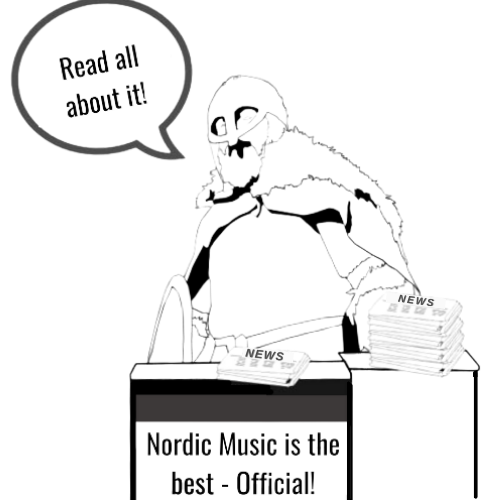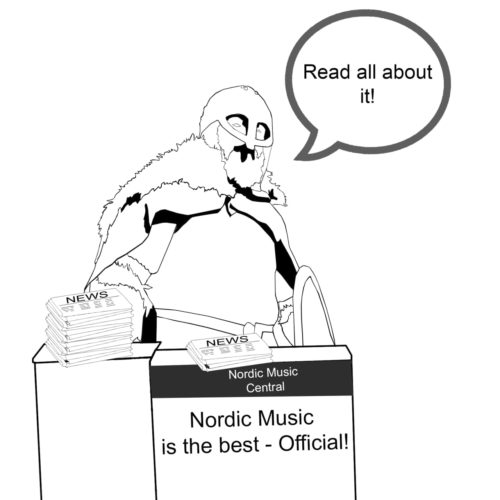Marianne Sveen is one of those artists who keeps in touch with her fans and followers as much as she can by way of social media and she has been posting a lot recently about this debut album, one that has been delayed for six long years by personal matters in the way of family illness. Marianne is still probably better known, in Norway and abroad, as a member of the multi-talented all-female band Katzenjammer than as a solo artist but ‘Next of Kin’ is about to change that.
In one post she refers to the album as being a “leap of faith” as “many of you out there might expect something closer to how you are used to hearing me. And I’m prepared that not all of you might be comfortable with that. But at least what you get is 100 % sincere and the biggest part of who I am.”
(She can take some comfort from the fact former band mate Sol Heilo, the first to debut as a soloist, found herself in a very similar position but it had no adverse impact whatsoever on her career).
She adds, “My biggest childhood, teenage, and grown-up dream has come true. Today I am releasing my debut solo album. It’s written from all of my heart, produced without boundaries or consideration, and brought to life by some of the finest people I know.”
Admitting that it has “taken a toll” on her (as those personal circumstances, which have resurfaced lately, must also have), she goes on to thank a myriad of people, relatives, friends and those from the music industry, who have helped her achieve this dream.
She ends with this illuminating observation, “To all of you who have moved me with your stories, making me dive into the meaning of being someone’s ‘next of kin’; It’s with the deepest respect I have taken your stories and the impact they have had on me, and turned them into songs that hopefully will resonate in others as well.”
Marianne was a psychiatric nurse before joining Katzenjammer; one of their songs, which she wrote, is about a female dementia patient finding contentment through music; and she has adopted causes as varied as the plight of refugees in the Middle East, actually visiting camps out there to help out physically, and anti-bullying campaigns.
In another recent post she revealed that a few years ago she decided to return to nursing, taking shifts, partly to help finance the completion of the album. She says, “It turned out to be something that would change the entire process. All the amazing people I met made me reflect on all the aspects of the term ‘next of kin’ – how many different things it can be and its impact on us, for better or worse. So I scratched more or less everything I had written until then and started over. There are so many stories out there that never will be told. But I hope, by telling a few of them, it will make others reflect on the term as well.”
I opted to spend a lot of time on this introduction to put the 10-track album into perspective. I’ve been privileged to meet and interview this remarkable lady and I knew as soon as I did that she was creating something that at one and the same time would be highly personal, emotional and acutely objective.
The opening track, ‘When Freedom Falls’ is explained in the sleeve notes as “For Alan, who didn’t make the fearful journey across the sea. We should never get used to the image of his body. We are all his next of kin.”
I’m sure this must refer to Alan Kurdi the three-year-old Syrian refugee who drowned in the Mediterranean Sea in 2015 along with his mother and brother, the newspaper photographs of his limp body on the beach sending shock waves around the word.
The lyrics are sparse but so were the hope and the help offered to him.
“Failed by his hope/Failed by his God/Failed and left behind/By us all”.
One might expect maximum emotional impact from this song and instrumentally it is provided by mandolins that sound like the lapping water and Ola Kvernberg’s powerful melancholic violins.
There is one line that intrigues me, which is screamed out twice by Marianne, “You started this”. It seems to be both an allegation and a question (why did you do it?) but directed to no-one in particular because as she also says, we all are guilty. I suspect that just as with the question ‘how come?’ in the fifth track, she is not expecting an answer any time soon.
The folky, 1980s-feel ‘Look Away’ was the first single released, over 18 months ago and almost provides light relief by comparison to what preceded it. It is a song about staying too long in a relationship that has a certain expectation to it and taking the courage to move on from something that’s beyond repair. It is tempting to find alternative meanings in it but I don’t think there are any. It’s a slow burner with a catchy chorus which builds up and evolves to the status of a power ballad in the last minute or so.
‘Don’t you forget about me’ is a cover of the Simple Minds classic, one which was reincarnated to support the initial hunt for the abducted Madeleine McCann in 2007. I’m wary of covers but of course Katzenjammer did them and I’ve often suspected that Marianne had a lot to do with their most famous one, Genesis’ ‘Land of Confusion’. In the sleeve notes she explains her take on it as “Lonely together is sometimes more lonely than lonely alone”, which really should be a lyric.
I was nervous about playing it but had to pick myself up off the floor. While the original melody is discernible she’s slowed it right down, minimalised it and huskily speaks it as much as sings it until it picks up volume and pace in the second half. And if I didn’t know who had recorded it I would not have guessed Marianne. The vocal in the early verses could be that of Fiona Apple and later, Mariah Carey.
It blew me away. If this isn’t being played on the BBC this week I’ll be writing to demand they refund my licence fee.
What appears on the album as the seemingly oddly titled ‘Airly Merrily’apparently began life with another title, ‘As the crow flies’.
Marianne introduces it by saying, “the most afraid, helpless and inadequate I have ever felt as a mother was watching my most precious one being torn to pieces by a treatment that was meant to save her life (she speaks of her daughter, Fia, who is receiving treatment for leukaemia). Too little to understand any of it, terrified of everything. And I was unable to save her from it all. When all you can do is try and comfort. Making empty promises that it will pass. And wait.”
As you might expect this song will play around with your emotions as she encapsulates the situation perfectly –
“Little but loud/Louder than me/Perfect undone/Ragged and meek
Bright is your blood/Green is your heart/What’s saving your life/Tears you apart
Airly, merrily/ Feary and brave little crow/Airly, merrily Fia/Where did you go?
The tune is almost incidental to this poetry but it is uplifting. I say that with a lump in my throat. And you’ll have one too when you hear the last line.
‘How Come’ is anti-bullying song, and the second single released. In her other profession she has met many people, of all ages, with deep psychological issues caused by bullying and which in some cases have been carried well into later life. The pattern is set straight away with ominous minor key piano chords including two that are repeated throughout and which have the same emotional impact as the opening chords of the Hill Street Blues theme tune.
Lyrically, it opens with the same line that was Antony and the Johnson’s 2005 Mercury Prize winning album title. A great start and the lyric is cutting throughout. “I’m a bird now…I can hang out in the branches of the tree I used to be…though my bark is paper thin and I’m unsteady in the wind”. The point being that as big and physically powerful as he was his gentleness was the catalyst for others to belittle him. Think ‘The Green Mile’ in some ways.
And the question being ‘how come’ no-one put a stop to it?; a constant refrain, reflective of a society where it is all too easy to walk away rather than act, one which has lost its moral compass. “No-one told them to stop. How come? How come”? Then, tragically, “I’m turning into the waste they taught me I was.”
When I first reviewed it as a single I said “There are a handful of songs that have tackled this delicate social issue, and especially where it applies to children, in a memorable fashion. I’m thinking especially of Christine and the Queens’ ‘Saint Claude’, Johanna Brun’s ‘Bird’ and Nightwish’s ‘Eva’. The best compliment I can pay Marianne is that ‘How Come’ is right up there with all of them.” A fabulous song.
‘Elephant’ was the last single to be released that I know of. One of the experiences that made her reflect on the term ‘Next of kin’ was meeting with those who have been let down as children by their closest family. She says, “This should be the safest place in the world. I have always associated my closest relatives with security, predictability, and care, but many people experience the opposite. Your loved ones are the most dangerous. And where do you hide then? How to escape? One dreamed of an elephant…” (to climb out of the false Noah’s Ark which offered no security).
Musically, ‘Elephant’ has more instrumentation than some of the other tracks with synthesisers, violins, horns, a couple of tasty Pink Floyd-like guitar breaks and accompanying empathetic bass line, together with what sounds like some traditional devices thrown in for good measure. Instrumentation and its employment which prompts honest comparison with The Beatles on their later albums and which complements the powerful melody line seamlessly.
But it is the compelling lyrics which, again, really hit home. Marianne has revealed the deeper meaning of the song but it is a distressing one and one that can be tied directly to that of ‘How Come’ which asked how no-one intervened to end a case of bullying. In this instance what was not stopped, and by a mother who could have, is far worse. Moreover, as she says, it is not a unique story by any means.
‘Before it hit me’ is directed at the lonely. She says, “I find myself feeling the loneliest in a crowd. Insignificant to all the strangers passing me. Trying to imagine how that must feel for those who have no one.”
A gentle half-paced piano and drum brushes ballad the devil is in the lyrical detail as, after repeating several times “I was sitting down before it hit me” (encouraging you to fear the worst), she reveals that what ‘hit her’ was the realisation that “I’m not ready, not ready to give up” thus turning a downbeat song into an upbeat one at a stroke.
Many of the tracks are suggestive of how hard life can be and that is the subject matter of ‘Right as Rain’, a track which she prefaces by, “unrightfully feeling as a burden, it may seem like the only option to disappear…no matter how much those around want them to stay.” Mindful of the previous track it may be she is singing about her own predicament here?
“There’s a time for living/and there’s a time to leave…
There’s a time for hoping/and there’s a time to be real.”
And the repeated refrain ‘Right as Rain’ is what we say of course when we are anything but.
Courtesy of the Ola Kvernberg string arrangement, her own vocal arrangement and multi-tracking of her voice here Marianne sounds like Agnes Obel. A very atmospheric track which bows out with an instrumental section that is nigh on perfect.
‘Get over it’ again appears to be a re-titled track, the original being ‘Sinners on a bridge’. The notes to this one are a little confusing:
“There will always be people close to us that make us feel less about ourselves. At some point at this road we are on, we are all sinners on a bridge. There’s no need to put it in flames, just get over it.”
So my interpretation is that it is a case of ‘get over it’ as in ‘move on’. We all have a cross to bear; don’t concern yourself with anyone else’s.
I’ll concern myself mainly with the musical content here because this song really rocks and it is the first time on the album that I was even vaguely reminded of Katzenjammer, which was first and foremost a rock band. Again, the strings in particular are exceptional.
And so to the final track, ‘Heavy enough to sink’, which is about how some children have to grow up very quickly and assume an adult role, for example if both parents are incapacitated, and how their own continuing need to be cared for is neglected.
Talk about saving the best until last. This is magnificent, the song of the year so far for me. The lyrics are genius; here are the opening and closing lines:
“Under here where I’m supposed to stay (presumably the duvet?)/ Is where I solve the world/It is where I solve the world
Under here where I’m supposed to be quiet/It is where I sing the loudest/Knowing I’ll never be heard…
But I must be/I must be heavy enough to sink/Heavy enough to sink”.
But more than the lyrics and its musical quality is the way Marianne sings it. Imagine one of those tear-jerker Pixar films (any of the Toy Story series, but WALL-E and Inside Out also spring to mind) where the lead character sings a sentimental song that kicks you in the feels and has you pretending to the kids that you’ve suddenly caught a cold or got something in your eye.
This is one of them. I don’t have to say any more than that.
‘Next of Kin’ runs the full gamut of emotions openly and honestly without ever becoming cloying as Marianne Sveen bares her soul, and helps convince you that we are all indeed kinsfolk. Whatever your mood you’ll find a song here to match it and if you’re in no particular mood you’ll very quickly develop one. That’s the mark of a true artist.
For the second time in two days I feel I must award 9/10 to a Norwegian album.
The best compliment I can pay to Marianne Sveen is to say that I hope that if and when I’m sent off to a retirement home it’s Marianne that will be looking after me.
On a serious note, this project begs the 64,000 dollar question, the one cannot be asked but some people reading this will expect it and even demand it. If one of the main reasons for quitting Katzenjammer was to write this album, which otherwise would not have been possible, now it’s done could that lead to a change of heart regarding that band? It’s something I’ve speculated on in the past and any sort of reunion would probably create more waves than ABBA’s, but right now I’m going nowhere near it.
More to the point is that with this marvelous album Marianne continues, as with her ex-colleague Sol Heilo, to put clear blue sky between her work in the band and their solo material, which is no bad thing, however much we love Katzenjammer.
‘Next of Kin’ is available now via DRABANT MUSIC.
Find her on:
Facebook: https://www.facebook.com/Dandylionmusic
Instagram: https://www.instagram.com/mariannesveenmusic/?hl=en




